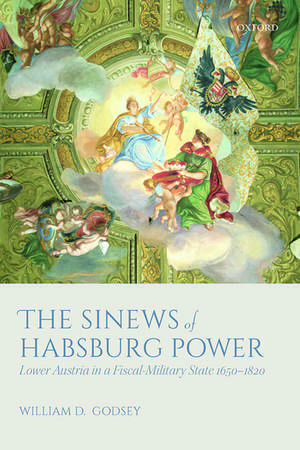The Sinews of Habsburg Power: Lower Austria in a Fiscal-Military State 1650-1820
Autor William D. Godseyen Limba Engleză Hardback – 11 ian 2018
Preț: 794.78 lei
Preț vechi: 1137.91 lei
-30% Nou
Puncte Express: 1192
Preț estimativ în valută:
152.10€ • 165.16$ • 127.76£
152.10€ • 165.16$ • 127.76£
Carte tipărită la comandă
Livrare economică 11-17 aprilie
Preluare comenzi: 021 569.72.76
Specificații
ISBN-13: 9780198809395
ISBN-10: 0198809395
Pagini: 482
Ilustrații: 10 black and white illustrations
Dimensiuni: 164 x 243 x 33 mm
Greutate: 0.88 kg
Editura: OUP OXFORD
Colecția OUP Oxford
Locul publicării:Oxford, United Kingdom
ISBN-10: 0198809395
Pagini: 482
Ilustrații: 10 black and white illustrations
Dimensiuni: 164 x 243 x 33 mm
Greutate: 0.88 kg
Editura: OUP OXFORD
Colecția OUP Oxford
Locul publicării:Oxford, United Kingdom
Recenzii
The implications of Godsey's arguments ... extend well beyond the confines of Lower Austria. The book is highly suggestive on a whole range of important aspects of early modern European history. Any early modern historian would benefit from reading this outstanding work.
Overall Godsey has produced an impressive history of the interdependence of central government and provincial Estates from a long term perspective. He shows why, despite the increasing requirements, the Austrian system of war finance not only did not trigger a political crisis, but also operated in a way that stabilized the system. His study enriches both the historiography of the Habsburg Monarchy and that on early modern state formation and war finance
[Godsey] delves deeply into the profound fiscal (as well as logistical) support that [the Estates] literally lent to the ever-growing Habsburg military; far from being overpowered or 'emasculated' along the road to absolutism, they proved to be indispensable partners in building the 'sinews of Habsburg power' ... Godsey should be congratulated for ... this bold and innovative study.
[Previous] work already demonstrated that the supposedly ramshackle Habsburg monarchy proved surprisingly resilient throughout the tough conflicts from the seventeenth to early nineteenth centuries, but so far we have lacked a clear explanation of how this was achieved. William Godsey's splendid new book goes a long way towards providing that missing answer.
Godsey's outstanding and fundamental study emphatically shows that 'central power' in the Habsburg composite monarchy did not develop against the Estates, but rather thanks to them.
Godsey's book is a tremendous achievement, and in particular, it will challenge historians of the later Habsburg Monarchy to re-think some of their assumptions about how it functioned over the long term.
What has been lacking is a long-term study of how provincial institutions worked, and how they fitted into the larger picture. William Godsey's Sinews of Habsburg Power provides a thorough and persuasive response to this need. ... With this important book, Lower Austria becomes a model for understanding why the Estates continued to have an essential role in the Austrian system.
Overall Godsey has produced an impressive history of the interdependence of central government and provincial Estates from a long term perspective. He shows why, despite the increasing requirements, the Austrian system of war finance not only did not trigger a political crisis, but also operated in a way that stabilized the system. His study enriches both the historiography of the Habsburg Monarchy and that on early modern state formation and war finance
[Godsey] delves deeply into the profound fiscal (as well as logistical) support that [the Estates] literally lent to the ever-growing Habsburg military; far from being overpowered or 'emasculated' along the road to absolutism, they proved to be indispensable partners in building the 'sinews of Habsburg power' ... Godsey should be congratulated for ... this bold and innovative study.
[Previous] work already demonstrated that the supposedly ramshackle Habsburg monarchy proved surprisingly resilient throughout the tough conflicts from the seventeenth to early nineteenth centuries, but so far we have lacked a clear explanation of how this was achieved. William Godsey's splendid new book goes a long way towards providing that missing answer.
Godsey's outstanding and fundamental study emphatically shows that 'central power' in the Habsburg composite monarchy did not develop against the Estates, but rather thanks to them.
Godsey's book is a tremendous achievement, and in particular, it will challenge historians of the later Habsburg Monarchy to re-think some of their assumptions about how it functioned over the long term.
What has been lacking is a long-term study of how provincial institutions worked, and how they fitted into the larger picture. William Godsey's Sinews of Habsburg Power provides a thorough and persuasive response to this need. ... With this important book, Lower Austria becomes a model for understanding why the Estates continued to have an essential role in the Austrian system.
Notă biografică
William D. Godsey studied modern history at the University of Virginia. He held research fellowships at the Institute for European History in Mainz, Germany, and the University of Vienna, Austria, where he has also taught. He is currently a Senior Research Associate of the Austrian Academy of Sciences, Vienna, and a Fellow of the Royal Historical Society.
